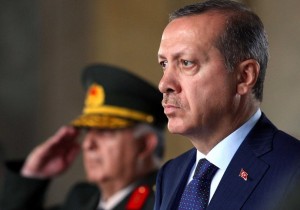Special to WorldTribune.com
ANKARA — Turkey, despite offers of Arab and U.S. support, has
assessed that its military was unable to lead a war against neighboring
Syria.
Western diplomatic sources said the government of Prime Minister Recep
Erdogan has concluded that Turkey, with the second largest army in NATO,
could not afford a war with Syria that would include its powerful allies.

They said Erdogan, in wake of consultations with the military and intelligence community, believes that any major Turkish attack on Syria would prompt intervention by Iran and Russia.
“If it would be just Turkey versus Syria, there would be no contest,” a
diplomat briefed on the consultations said. “But Turkey is not
strong enough to fight Iran and Russia without massive help from NATO.”
The sources said Ankara concluded that NATO, scheduled to convene on June 26, would not help Turkey in any war against Syria. They said most of the members of the Western alliance, including Britain and France, have already relayed such a message to Erdogan. The United States is also said to have urged Turkey to maintain restraint.
“We will be obviously looking to Turkey to be restrained in its
response,” EU foreign policy chief Catherine Ashton on June 25.
The Turkish assessment was reached after three days of consultations by
Erdogan with military and intelligence chiefs over a response to the Syrian
downing of a Turkish Air Force F-4E fighter-jet on June 22. The sources said
the military and intelligence community agreed that the regime of President
Bashar Assad shot down the Turkish warplane after repeated Turkish
reconnaissance operations over northeastern Syria.
“Military intervention in Syria is out of the question,” Dutch Foreign
Minister Uri Rosenthal said.
On June 25, Ankara said Syria’s military fired at another Turkish
warplane. The Turkish military said the second warplane, sent to search for
the downed F-4E in the eastern Mediterranean, was not struck by Syrian
surface-to-air missiles.
Among the scenarios studied by the Turkish leadership included a war
with Syria in which Russian pilots would fly MiG-29 fighter-jets and Mi-24
attack helicopters. The scenarios also envisioned Russian Navy deployment along the
coast of Syria and Turkey as well as Iranian sponsorship of Kurdish attacks
on major Turkish cities. Erdogan was expected to issue a statement on June
26.
The sources said the Syrian decision to shoot down the Turkish F-4E was
taken in consultation with Iran and Russia. They did not rule out that
Russian personnel had already taken over operations of much of Assad’s air
defense assets along the Mediterranean Sea as well as the border with
Turkey.
“We would have shot down 114 planes if every aircraft that violated a
country’s air space were shot down without questioning,” the Turkish General
Staff said. “Air space violations are incidents that happen almost every
day, and are resolved in a matter of minutes within international law.”
Seyfettin Erol, director of Ankara’s International Strategic and
Security Research Center, went further. Erol said Assad was being helped by
a coalition that also included China and Iraq, in effect surrounding Turkey
by hostile neighbors.
“By shooting down the Turkish plane, these countries wanted to give a
message to the international community that they would protect this [Syrian]
front at all costs, including a war,” Erol said.
Erol said Turkey was not prepared for a confrontation with Syria. But he
warned that Turkey’s failure to respond to the Syrian attack would damage
deterrence.
The sources said Turkey was receiving diplomatic support and promises of
aid from the United States as well as Gulf Cooperation Council states. But
they said neither Washington nor the GCC was expected to join Ankara in
combat.
“In my opinion, Turkey, which has remained silent to Assad’s insults,
will reach a stage where it will have no choice but to intervene in order to
defend its interests,” said Abdul Rahman Al Rashed, general manager of the
Saudi-owned Al Arabiya satellite channel and regarded as close to the Saudi
royal family. “The difference is if it intervenes now, it will receive huge
popular and material support from the Arabs and others who hate the crimes
being committed by the Assad regime.”

You must be logged in to post a comment Login